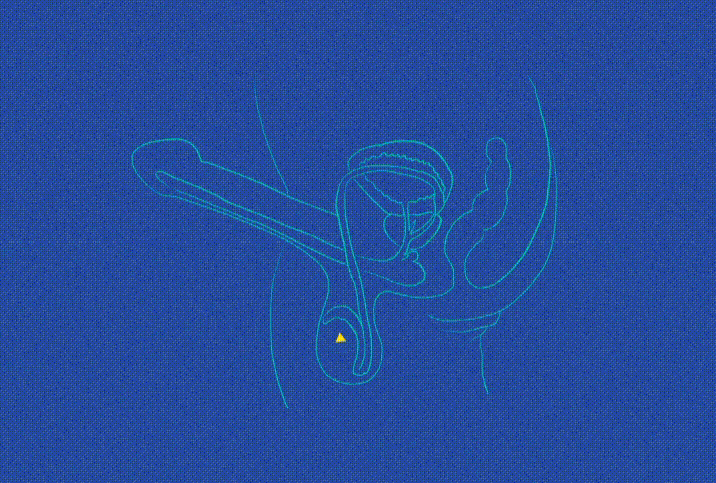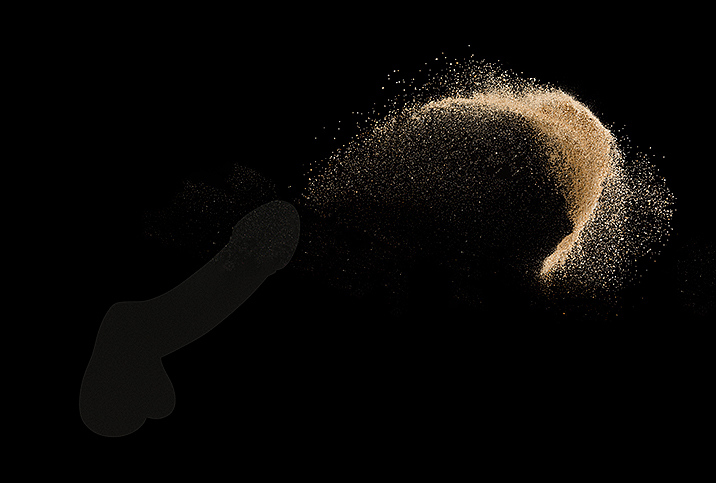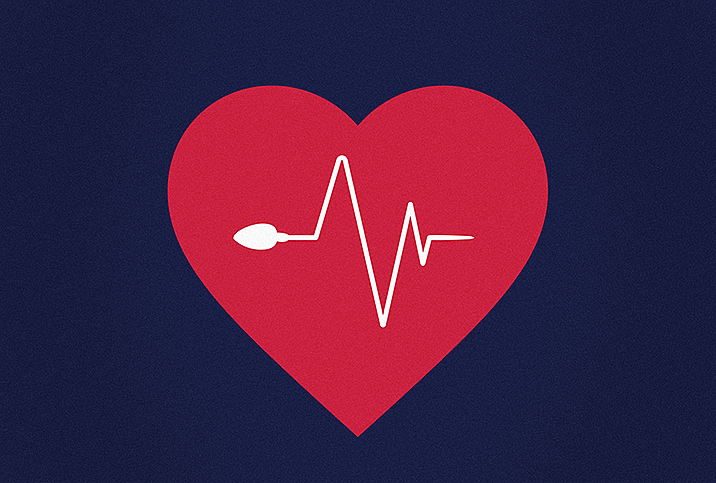Where Did My Ejaculate Go?

Ejaculate varies in volume, color and consistency, but for many men, the expulsion of semen that typically coincides with euphoric pleasure and sexual climax—yes, orgasm and ejaculation are two distinct processes—is paramount to a satisfying sexual release. Ejaculate represents the visual component of an intangible experience that is instinctively and culturally significant as a function of sexual enjoyment for recreation, procreation or even parallel health benefits.
When ejaculation doesn't occur in the way we're used to, it can cause concern and inspire questions about a broad-ranging scope of health issues. Some fluctuation in ejaculate is normal, depending on orgasm frequency, but the absence of observable semen may be jarring, especially when someone hasn't ejaculated in a while or they historically have produced an ample volume of semen.
These orgasms, colloquially referred to as "dry orgasms," may be the result of retrograde ejaculation. In such cases, there's not an absence of semen, but rather the semen is going to the wrong place: the bladder. The number of men who suffer retrograde ejaculation is difficult to determine, but a 2016 study in the journal Translational Andrology and Urology found that despite the assumed prevalence of retrograde ejaculation, it accounts for only 0.3 to 2 percent of infertility cases.
Causes and concerns
What causes retrograde ejaculation? Nerve damage caused by diabetes or other conditions and certain surgeries are culprits, but more often than not, it has to do with the overall health of the prostate gland.
"I will say that most commonly when I see a man for retrograde ejaculation, it's actually a side effect of a medication that they're taking for prostate enlargement," said Petar Bajic, M.D., a urologist and an expert in male sexual dysfunction at the Cleveland Clinic.
Certain medications for an enlarged prostate relax the smooth muscle inside the prostate, located in the bladder neck area, where a seal forms between the bladder and the prostate. This seal is supposed to keep semen from falling back into the bladder. The relaxed muscle allows urine to flow out more readily, which is good, but a side effect can cause the muscle to remain relaxed at the time of orgasm, therefore semen doesn't ejaculate.
Fortunately, retrograde ejaculation isn't necessarily a cause for concern, because there are no inherent health risks to having semen flow into the bladder rather than out the tip of the penis. Nonetheless, any change to what some men would consider "normal" sexual function can be alarming. Ejaculation may be associated with certain aesthetic or even pleasure-based responses to which a person can become accustomed, so when orgasm occurs but ejaculation does not, some men and their partners may be confused.
If the experience becomes chronic, it can lead to emotional or psychological reactions that may impede a person's pleasure or enjoyment of sexual activity.
"Some men can be very bothered by this," Bajic said. "Seeing the ejaculation can be a very important part of their experience of sexual activity with their partner."
There's not an absence of semen, but rather it's going to the wrong place: the bladder.
Beyond the visual or sensory stimulation ejaculation may provide, there is obviously an important biological function associated with semen and the ability to eject sperm from the penis upon orgasm. Retrograde ejaculation may put a damper on recreational sex, but it can undermine procreational sex completely.
"This can be a cause of male infertility," Bajic explained, "but it's really important to see a men's infertility specialist to help differentiate if they're truly having retrograde ejaculation or if it's actually anejaculation, meaning they orgasm and no semen is released at all."
Figuring out what's going on with reproductive and biological health issues is not something you want to do alone at the helm of a search engine. Your body is made up of many interlinked systems and functions, and it can be easy to overlook one aspect if you become too focused on others.
For example, conception is a complex and intricate process. Between partners, there are countless aspects that can go wrong or right in the process of trying to have a baby. During penetrative sex, it may be difficult to identify whether sperm are evacuating the body as passengers in semen, and the quality of the sperm plays a multitude of roles in reproductive health, as well. Even if you do identify that a man isn't producing sperm during ejaculation, it doesn't necessarily mean retrograde ejaculation is the cause. As Bajic noted, anejaculation is also possible and happens for different reasons than retrograde ejaculation. It may be due to a blockage or a condition at birth that prevents semen from coming out.
Other associated conditions
Diabetes is one of the most common conditions associated with retrograde ejaculation, said Amin Herati, M.D., an assistant professor of urology and the director of Male Infertility and Men's Health for Johns Hopkins Medicine in Baltimore. He explained that diabetes leads to a physical state poorly suited to facilitate the usual ejaculatory function, because the muscles that would normally contract to prevent retrograde ejaculation aren't working as well as they should.
Other neurological conditions can have the same effect. Herati cited multiple sclerosis as a condition that may present itself by causing retrograde ejaculation. However, these conditions are typically diagnosed before retrograde ejaculation becomes a factor, as they have far-reaching effects on the body.
Similarly, certain medical procedures may lead to retrograde ejaculation, such as surgeries that affect the peripheral nerves, lymph node dissections for testicular cancer, and certain operations on the colon and intestines. Obviously, these are serious health conditions deserving of ample attention, but they are unlikely to be diagnosed as a result of retrograde ejaculation.
Should retrograde ejaculation be treated?
"The only time that I typically recommend patients correct [retrograde ejaculation] is when they are trying to achieve a pregnancy," Herati said. "Outside of that context, the medications could be more harmful than there is a benefit."
If retrograde ejaculation is preventing a couple from conceiving a child, medications may help. Pseudoephedrine is one medicine that can help revitalize normative ejaculatory function. Alternatively, a fertility specialist may be able to recommend processes for harvesting sperm and utilizing assisted reproductive technologies, according to Bajic.
If a man is jarred by the experience of retrograde ejaculation or wishes to address it strictly for aesthetic or visual aspects of ejaculation, they may benefit more from talking to a specialist. This could be a urologist, a fertility specialist or even a mental health professional. While sexual dysfunction can be alarming, a little bit of guidance from someone in the know can help men feel better about whatever is going on.
Though, in the case of retrograde ejaculation, the issue to address is actually a matter of what isn't going on.


















